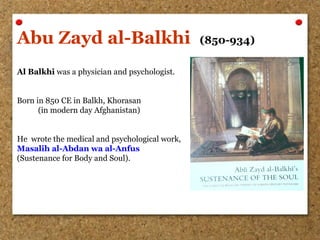
Al Balkhi (9th Century Muslim Psychologist)
- 1. Abu Zayd al-Balkhi (850-934) Al Balkhi was a physician and psychologist. Born in 850 CE in Balkh, Khorasan (in modern day Afghanistan) He wrote the medical and psychological work, Masalih al-Abdan wa al-Anfus (Sustenance for Body and Soul).
- 2. Mental health and mental illness In Islamic psychology, the concepts of mental health and "mental hygiene" were introduced by Abu Zayd al-Balkhi, who often related it to spiritual health. In his Masalih al-Abdan wa al-Anfus (Sustenance for Body and Soul), he was the first to successfully discuss diseases related to both the body and the soul. He used the term al-Tibb al-Ruhani to describe spiritual and psychological health, and the term Tibb al-Qalb to describe mental medicine. He criticized many medical doctors in his time for placing too much emphasis on physical illnesses and neglecting the psychological or mental illnesses of patients, and argued that "since man’s construction is from both his soul and his body, therefore, human existence cannot be healthy without the ishtibak [interweaving or entangling] of soul and body.
- 3. Cognitive and medical psychology and cognitive therapy Abu Zayd al-Balkhi was the first to differentiate between neurosis and psychosis, and the first to classify neurotic disorders and pioneer cognitive therapy in order to treat each of these classified disorders. He classified neurosis into Four emotional disorders: fear and anxiety, anger and aggression, sadness and depression, and obsession. He further classified three types of depression: normal depression or sadness (huzn), endogenous depression originating from within the body, and reactive clinical depression originating from outside the body.
- 4. He also wrote that a healthy individual should always keep healthy thoughts and feelings in his mind in the case of unexpected emotional outbursts in the same way drugs and First Aid medicine are kept nearby for unexpected physical emergencies. He stated that a balance between the mind and body is required for good health and that an imbalance between the two can cause sickness. Al-Balkhi also introduced the concept of reciprocal inhibition (al-ilaj bi al-did), which was re-introduced over a thousand years later by Joseph Wolpe in 1969.
- 5. Psychophysiology and psychosomatic medicine The Muslim physician Abu Zayd al-Balkhi was a pioneer of psychotherapy, psychophysiology and psychosomatic medicine. He recognized that the body and the soul can be healthy or sick, or "balanced or imbalanced", and that mental illness can have both psychological and/or physiological causes. He wrote that Imbalance of the body can result in fever, headaches and other physical illnesses, while Imbalance of the soul can result in anger, anxiety, sadness and other mental symptoms.
- 6. " He further argued that "if the body gets sick, the nafs [psyche] loses much of its cognitive and comprehensive ability and fails to enjoy the desirous aspects of life" and that "if the nafs gets sick, the body may also find no joy in life and may eventually develop a physical illness. " Al-Balkhi traced back his ideas on mental health to verses of the Qur'an and hadiths attributed to Muhammad, such as: "In their hearts is a disease."Qur'an 2:10 "Truly, in the body there is a morsel of flesh, and when it is corrupt the body is corrupt, and when it is sound the body is sound. Truly, it is the qalb [heart]." Sahih al-Bukhari, Kitab al-Iman "Verily Allah does not consider your appearances or your wealth in (appraising you) but He considers your hearts and your deeds." Musnad Ahmad ibn Hanbal, no. 8707
- 7. He recognized two types of depression: one caused by known reasons such as loss or failure, which can be treated psychologically through both external methods (such as persuasive talking, preaching and advising) and internal methods (such as the "development of inner thoughts and cognitions which help the person get rid of his depressive condition"); and the other caused by unknown reasons such as a "sudden affliction of sorrow and distress, which persists all the time, preventing the afflicted person from any physical activity or from showing any happiness or enjoying any of the pleasures" which may be caused by physiological reasons (such as impurity of the blood) and can be treated through physical medicine. He also wrote comparisons between physical disorders with mental disorders, and showed how psychosomatic disorders can be caused by certain interactions between them.